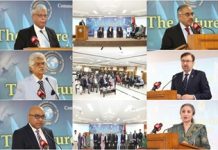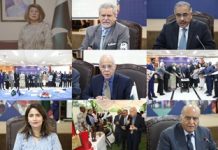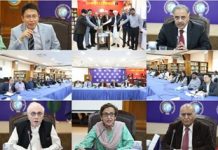The Institute of Strategic Studies, Islamabad (ISSI) organised a seminar on “The Mounting Challenges in Pakistan- India Relations” today. The keynote speaker at the seminar was Senator Raja Zafar ul Haq, Leader of the House, Senate of Pakistan. Other eminent speakers at the seminar included, Lt. Gen. (Retd.) Waheed Arshad, former CGS, Pakistan Army, Mr. Ahmar Bilal Soofi, former Law Minister and Advocate Supreme Court of Pakistan, Dr. Rifaat Hussain, HoD, Government and Public Policy, NUST, Lt. Gen. (Retd) Talat Masood, Defence Analyst, Mr. Syed Talat Hussain, Host, ‘Naya Pakistan’, Geo TV.
In his welcome remarks, the Director General ISSI, Amb. Masood Khan highlighted the fact that whatever happened in the past couple of months from the Indian side has pushed the entire region to confrontation. Giving the chronology of the events since Prime Minister Modi came into power, he said that the issues ranging from cancellation of foreign secretary level talks to hype against CPEC, and the belligerent statements by the Indian defence and information ministers led to the escalation of problems in Indo-Pak relations. He highlighted the measured, balanced and statesmanlike, yet robust response given by the Pakistan government. He suggested that the problems could only be resolved by the resumption of the dialogue process. He however, postulated that both conventional and non-conventional threats must be kept in view while making peace and Pakistan would defend its core interests.
Senator Raja Zafar ul Haq, Leader of the House Senate of Pakistan, gave the historic account of problems between the two states since their creation. He added that the occupation of Kashmir and Hyderabad created the state of enmity between Pakistan and India. Talking on the emergence of recent tension between the two countries, he acknowledged the role of international community which played a significant role in bringing normalcy to the situation. He quoted the fact that Quaid e Azam Muhammad Ali Jinnah wanted cordial relations with India just like relations between Canada and USA. Talking about initiatives like Aman ki Aasha, the Senator said that it was a strong blitz, but these people think they will remove lines between Pakistan and India. He said Prime Minister Mian Muhammad Nawaz Sharif always wished to have regional stability, bilateral trade and cordial relations with all the neighbouring countries. He further emphasised that we need to strengthen ourselves internally.
While expressing his views on the recent aggressive statements emanating from India, Lt. Gen. Waheed Arshad said that such statements should not come as a surprise for Pakistan. Pakistan is fighting multiple wars i.e at regional front, eastern front and internal front. He discussed at length the situation in Afghanistan and emerging challenges for Pakistan. He was of the view that this is the first time that a Hindu mindset has taken charge of the government in India with the ambitions of becoming a global power. It finds Pakistan as a stumbling block. He identified several challenges for India-Pakistan relations like the lack of common agenda in the bilateral dialogue context, Afghanistan, presence of non-State actors in both the countries and lack of strategic stability in South Asia. He suggested that Pakistan should aggressively pursue its Kashmir policy and All Parties Hurriyat Conference should assume a more proactive role in main stream politics.
Renowned lawyer and former Law Minister Mr. Ahmar Bilal Soofi highlighted the fact that it is an obligation of all the countries to support and cooperate with Pakistan in its fight against extremism and terrorism. Unfortunately, India is not only shying away from this obligation but also creating obstacles. India’s intelligence agencies are strengthening non- state actors within Pakistan to perpetuate terror. This is an open breach of International law on two counts. First, India is making it difficult for Pakistan to carry out its duty of fighting terrorists and second, by creating obstacles, India is interfering in Pakistan’s internal affairs.
Dr. Rifaat Hussain, Head of Department, Government and Public Policy, NUST was of the view that Pakistan unfortunately misread the rise of Modi to power in India. With Modi assuming power, Pakistan thought that it would open a new chapter in India-Pakistan relations. One has to keep in mind that Modi has unsavoury past and he is surrounded by advisors who are known for Pakistan bashing. Modi government desires to deal with Pakistan from the position of strength. Dr. Rifaat highlighted key elements of the Modi-Doval doctrine which wanted to weaken Pakistan through the rise of non-state actors. India plans to take advantage of Pakistan’s fault lines besides aligning itself with non-state actors within Pakistan.
Lt. Gen (Retd.) Talat Masood deliberated that India is the most important country in its foreign policy perceptions but regretted that the relations have been in a difficult phase in the recent past. It is more for India to decide for whether they want to continue with belligerency or want to cooperate and stay a part of the South Asian Region. The relationships in South Asia have taken a new shift with Pakistan and Afghanistan improving relations after the coming of Ashraf Ghani into power. This has a direct impact on Indo-Pakistan relations since India finds decrease in its role. He explained that Modi’s government is taking an obstinate view of the relationship because it wants Pakistan to forget about Kashmir. It is dangerous for Modi to take a hostile stance since both countries are nuclear weapon states. He warned that militants may use the rift between Pakistan and India to create problems for both the countries. Pakistan needs to manage this confrontation with dignity and respectability.
Final speaker of the session, Talat Hussain, said that Pakistan has always had a reactive policy towards India. And the world views their relationship as a mutually engaged chicken game. However, the game is one-sided. Modi’s Pakistan policy based on spurt treatment and zero breathing space means aggressive control followed by sprinkling of goodwill. But, the application of pressure remains relentless. India wants to retain an image of a reasonable international player bothered by an unreasonable regional actor. He suggested that Pakistan needs to adopt a pro-active diplomacy and do away with the ‘gesture diplomacy’ and ‘empty rhetoric’. It needs to develop a coherent India policy.
In his concluding remarks, Chairman ISSI, Amb.(Retd) Khalid Mahmood expressed remorse that Kashmiris movement for self-determination has been invariably connected with terrorism and Modi’s policies have accentuated this belief. India is strengthening this argument for its bid of membership in the UN Security Council. He said that the policy of the present government is of friendly neighbourhood, and economic development, and suggested that Pakistan should keep the door open for composite dialogue.
Shamsa/Mahwish/Asad Ullah/23062015











